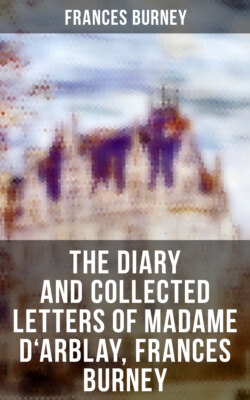Читать книгу The Diary and Collected Letters of Madame D'Arblay, Frances Burney - Frances Burney - Страница 36
На сайте Литреса книга снята с продажи.
The Crying Beauty and her Mother
ОглавлениеBrighthelmstone, October 12.—On Tuesday Mr., Mrs., Miss Thrale, and “yours, ma’am, yours,” set out on their expedition. The day was very pleasant, and the journey delightful.
We dined very comfortably at Sevenoaks, and thence made but one stage to Tunbridge. It was so dark when we went through the town that I could see it very indistinctly. The Wells, however, are about seven miles yet further, so that we saw that night nothing; but I assure you, I felt that I was entering into a new country pretty roughly, for the roads were so sidelum and jumblum, as Miss L— called those of Teignmouth, that I expected an overturn every minute. Safely, however, we reached the Sussex Hotel, at Tunbridge Wells.
Having looked at our rooms, and arranged our affairs, we proceeded to Mount Ephraim, where Miss Streatfield resides. We found her with only her mother, and spent the evening there.
Mrs. Streatfield is very—very little, but perfectly well made, thin, genteel, and delicate. She has been quite beautiful, and has still so much of beauty left, that to call it only the remains of a fine face seems hardly doing her justice. She is very lively, and an excellent mimic, and is, I think, as much superior to her daughter in natural gifts as her daughter is to her in acquired ones: and how infinitely preferable are parts without education to education without parts!
The fair S. S. is really in higher beauty than I have ever yet seen her; and she was so caressing, so soft, so amiable, that I felt myself insensibly inclining to her with an affectionate regard. “If it was not for that little, gush,” as Dr. Delap said, I should certainly have taken a very great fancy to her; but tears so ready—oh, they blot out my fair opinion of her! Yet whenever I am with her, I like, nay, almost love her, for her manners are exceedingly captivating; but when I quit her, I do not find that she improves by being thought over—no, nor talked over; for Mrs. Thrale, who is always disposed to half adore her in her presence, can never converse about her without exciting her own contempt by recapitulating what has passed. This, however, must always be certain, whatever may be doubtful, that she is a girl in no respect like any other.
But I have not yet done with the mother: I have told you of her vivacity and her mimicry, but her character is yet not half told. She has a kind of whimsical conceit and odd affectation, that, joined to a very singular sort of humour, makes her always seem to be rehearsing some scene in a comedy. She takes off, if she mentions them, all her own children, and, though she quite adores them, renders them ridiculous with all her power. She laughs at herself for her smallness and for her vagaries, just with the same ease and ridicule as if she were speaking of some other person; and, while perpetually hinting at being old and broken, she is continually frisking, flaunting, and playing tricks, like a young coquet.
When I was introduced to her by Mrs. Thrale, who said, “Give me leave, ma’am, to present to you a friend of your daughter’s—Miss Burney,” she advanced to me with a tripping pace, and, taking one of my fingers, said, “Allow me, ma’am, will you, to create a little—acquaintance with you.”
And, indeed, I readily entered into an alliance with her, for I found nothing at Tunbridge half so entertaining, except, indeed, Miss Birch, of whom hereafter.
